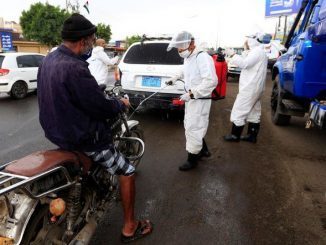
Egypt’s recent history shows that indiscriminate military responses to terror only escalate the situation, according to The Guardian.
Egypt’s Abdel Fattah al-Sisi, cultivates a hard-man image. His response to Friday’s atrocity at al-Rawdah mosque in northern Sinai was wholly predictable. Hours after Islamic State-linked gunmen killed more than 300 Sufi worshipers, Sisi sent waves of warplanes to exact revenge. “The air force has … eliminated a number of outposts used by terrorist elements,” the military said.
If only it were that easy. If Sisi and his generals knew the location of such terrorist outposts, why had they not already been destroyed? It is probable the targets were chosen randomly and yet more innocent lives may now have been lost. This, in turn, may exacerbate Egypt’s long-running problem with Islamist insurgents.
Speaking to the nation after the mosque attack, Sisi – a former general who seized power in 2013 in a military-backed coup against the elected Muslim Brotherhood government – reverted to the only language he knows. “The police and military will avenge our martyrs and restore peace and security,” he said. “We will respond with brute force.”
But like an alcoholic who takes a drink and hopes that somehow the outcome will be different this time, Sisi’s addiction to violence is a kind of madness. Egyptian leaders before him, notably Hosni Mubarak, all tried to physically crush their opponents. They all failed. And Sisi will, too.
In the 1990s, before al-Qaida and Isis fully emerged, Islamist extremists tried to weaken Mubarak’s autocratic regime by targeting security forces, the Coptic Christian minority, and western tourists in Luxor. The official response, notably in underdeveloped Upper Egypt, was mass arrests, shoot-to-kill orders, torture and a scorched earth policy.
“Those actions destroyed the livelihoods of farmers and their families, who then became prey for recruitment by the very groups the government was trying to defeat,” says Mona Eltahawy, a Reuters correspondent in Cairo at the time.
More recently, the largely ungoverned spaces of northern Sinai province have become a new locus of militant activity. Sinai has been under a state of emergency, and closed to outside agencies and media, since 2014, when militants killed 30 Egyptian soldiers. In 2015, a Russian passenger jet carrying 224 tourists and crew from Sharm el-Sheikh was shot down.
Friday’s atrocity, like the airliner attack, has been blamed on Wilayat al-Sinai, an Islamist group with links to Isis that has previously hit Coptic churches in Cairo and Alexandria, although no claim of responsibility has yet been reported.
Sisi’s “iron fist” tactics have proved futile. The Isis connection appears to be strengthening as the terror group’s “caliphate” in Iraq and Syria is degraded. Isis is reportedly regrouping in neighbouring Libya. Northern Sinai may also become a destination of choice for displaced jihadis.
Unlike al-Qaida, which generally eschews civilian targets, Wilayat appears bent on maximum mayhem. By murdering Muslims, albeit Sufi Muslims who zealots view as apostates, the group has issued a challenge to Egyptian society as a whole.
Such lethal recklessness could eventually prove Wilayat and Isis’s undoing, by alienating ordinary Egyptians and people in similarly impacted Arab countries. But Sisi’s unthinking return violence could have the opposite effect, leading to further unchecked escalation.
Long experience shows that more killings, repression and dictatorial rule are not the answer for Egypt, any more than for other post-Arab Spring countries. Egypt under Sisi has become a black hole for human rights and democratic governance. Yet the US and Britain turn a blind eye, while a bloodthirsty Donald Trump tweets demands for revenge.
Until the state rejects systemic violence as a form of policy, the violence of non-state actors will persist and grow. That’s a hard lesson for a hard man like Sisi



